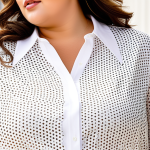Overview of Eco-Friendly Outerwear
Eco-friendly outerwear is pivotal in sustainable fashion, offering both ethical and environmental benefits. It emphasizes the use of eco-friendly materials, such as organic cotton and recycled polyester, reducing the carbon footprint associated with clothing production. This approach aligns with a broader commitment to lessen the ecological impact, crucial in combatting issues linked to fast fashion. Fast fashion, characterized by rapid production cycles and disposable clothing, significantly exacerbates landfill accumulation and pollution.
In the UK, the sustainable fashion movement has gained momentum, as consumers increasingly prioritize environmentally conscious choices. This trend is evident as major UK brands innovate by introducing eco-friendly outerwear lines, featuring designs that marry sustainability with style. Traditional production methods are being replaced with eco-friendly alternatives, such as water-saving dye techniques and low-impact manufacturing processes.
Also to read : Discovering the Elite British Tailors: Your Ultimate Guide to Luxurious Bespoke Suit Masterpieces
By choosing sustainable fashion, individuals contribute to a more ethical labor environment while supporting brands that foster genuine responsibility towards the planet. As these practices gain prevalence, the market for eco-friendly outerwear continues to expand, offering myriad choices that do not compromise on quality or aesthetic appeal.
Top Eco-Friendly Outerwear Brands in the UK
When selecting top eco-friendly brands of sustainable outerwear in the UK, criteria such as ethical manufacturing, use of eco-friendly materials, and transparency in business practices are crucial. Let’s delve into some noteworthy brands that meet these standards.
Additional reading : Discover the Best Sustainable Yoga Mat Brands in the UK: Elevate Your Eco-Friendly Practice
Stella McCartney stands out with its commitment to using sustainable materials and innovative production techniques, setting a high bar for luxury and eco-conscious fashion. Meanwhile, People Tree, known for pioneering organic cotton in the UK, emphasizes fair trades and artisanal skills, reflecting deep-rooted ethical values. Another exemplar is BAM, focusing on bamboo-derived fabrics for their outerwear, renowned for their comfort and minimal environmental impact.
Each of these brands offers unique selling points (USPs): from Stella McCartney’s fashion-forward designs to People Tree’s emphasis on ethical production and BAM’s comfort-centric approach. Consumers interested in sustainable fashion benefit not only from superior clothing quality but also by supporting companies steering the industry towards greater sustainability. This conscious choice furthers the move away from environmentally detrimental fast fashion, encouraging sustainable practices within the fashion sphere. Their unique approaches highlight a broader trend of incorporating ethics and sustainability into fashion, resonating with the values of modern consumers.
Brand Sustainability Practices
Sustainability practices within the fashion industry are vital for eco-friendly outerwear to flourish. They guide ethical manufacturing, which includes fair trade, safe working conditions, and ensuring labor standards are met. Establishing a reputation for ethical manufacturing involves transparency with consumers and implementing fair training and policies for factory workers.
Material Sourcing
High-quality eco-friendly materials are central to sustainable practices. Brands commit to using organic cotton and recycled polyester, which requires less energy and water than conventional materials. The use of sustainable materials not only minimizes environmental impact but also maximizes the lifecycle of outerwear, further supporting sustainable fashion.
Manufacturing Processes
Incorporating eco-friendly production methods revolutionizes how clothing is manufactured. These methods, including renewable energy usage and reduced water waste techniques, enhance efficiency while lessening ecological harm. This approach aligns with ethical labor standards, focusing on workers’ welfare and emphasizing sustainability over speed associated with fast fashion.
Certifications and Eco-Labels
Key certifications like GOTS (Global Organic Textile Standard) serve as a benchmark in sustainable fashion. These certifications verify the organic status of materials and ethical production processes. For consumers, such certifications represent reliable assurance of a brand’s commitment to sustainable practices, enhancing trust and brand reputation.
Product Ranges and Pricing
In the realm of eco-friendly outerwear, UK brands offer an impressively diverse product range. From sustainable fashion staples like jackets and coats made from organic cotton and recycled polyester, to cutting-edge designs, consumers are spoilt for choice. These products not only ensure minimal ecological impact, but they also embody style and durability.
However, it’s crucial to consider the pricing comparison across different eco-friendly outerwear options. While sustainable options may be priced higher than fast-fashion counterparts, the value proposition of investing in such outerwear is unmatched. Consumers often find that sustainable pieces endure longer, justifying the initial outlay by reducing the need for frequent replacements.
Each UK brand typically offers a spectrum of price points, catering to budget-conscious individuals and those inclined towards premium selections. This allows for flexibility in spending, aligning with varying consumer priorities and lifestyles. Opting for eco-friendly fashion, therefore, not only supports the planet but also offers a wardrobe that stands the test of time both in terms of trends and durability. With such thoughtful investments, the true cost of fashion begins to align more closely with ethical and sustainable values.
Customer Reviews and Feedback
Understanding customer reviews is essential when assessing brand reputation in the eco-friendly outerwear market. Common feedback themes frequently highlight satisfaction with product quality and the ethical ethos of brands. Many users commend the durability and style of sustainable outerwear, reflecting positively on their investment in sustainable fashion.
Brand reputation plays a pivotal role in customer loyalty. UK brands have garnered trust by consistently offering products that align with eco-conscious values. Successful stories often feature consumers who express delight over the blend of aesthetic appeal and environmental responsibility offered by such outerwear.
In terms of user experiences, anecdotal evidence suggests that eco-friendly outerwear not only meets but often exceeds expectations in comfort and performance. Customers particularly appreciate the use of eco-friendly materials, which enhance both the longevity and the ecological footprint of their attire.
Ultimately, these insights underline the significance of transparency and quality in fostering brand trustworthiness. By continuously delivering garments that resonate with ethical standards, UK brands solidify their standing among environmentally aware consumers. Emphasizing genuine commitment to sustainability fosters profound loyalty and drives continued customer engagement.
Tips for Incorporating Sustainable Fashion
Incorporating sustainable fashion into your wardrobe can be both rewarding and environmentally responsible. Start by curating a sustainable wardrobe that includes key outerwear essentials crafted from eco-friendly materials like organic cotton and bamboo. This ensures your collection is both stylish and environmentally conscious.
When selecting pieces, consider opting for versatile designs that complement various outfit combinations. This approach maximizes the use of each item, promoting fewer purchases and reducing waste. To enhance your eco-friendly styling, experiment with layering techniques to create unique looks while maintaining comfort and functionality.
Caring for your eco-friendly outerwear is essential to prolong its lifespan. Wash garments less frequently and at lower temperatures to preserve fabric quality and reduce water usage. Air drying is preferable over tumble drying to further decrease energy consumption and maintain garment integrity.
By adhering to these fashion tips, you not only support sustainable practices but also contribute to reducing the environmental impact of your wardrobe choices. This mindful approach fosters a more ethical and sustainable future in fashion, aligning with values centered on quality, longevity, and environmental stewardship.
Where to Buy Eco-Friendly Outerwear
Navigating the landscape of eco-friendly outerwear often begins with selecting the right retailer. For online shopping, several UK brands are prominent for sustainability, offering dedicated sections featuring sustainable fashion. Notable online stores include ASOS and Zalando, both showcasing collections that highlight eco-friendly materials and ethical manufacturing.
Incorporating sustainable fashion from physical stores can enhance your experience by allowing you to see and feel the quality firsthand. Sustainable retailers such as Marks & Spencer and John Lewis devote sections of their stores to eco-conscious selections, giving you tangible access to their offerings.
If you’re open to alternative purchasing methods, consider second-hand options and clothing swaps. Charity shops and platforms like Depop and eBay provide access to pre-loved outerwear, blending sustainability with affordability.
These avenues offer diverse options for buying eco-friendly outerwear, ensuring you can find products aligning with both your style and environmental principles. By choosing retailers committed to sustainability, you’re contributing to a positive impact on the planet while enhancing your wardrobe with high-quality, ethical pieces.






